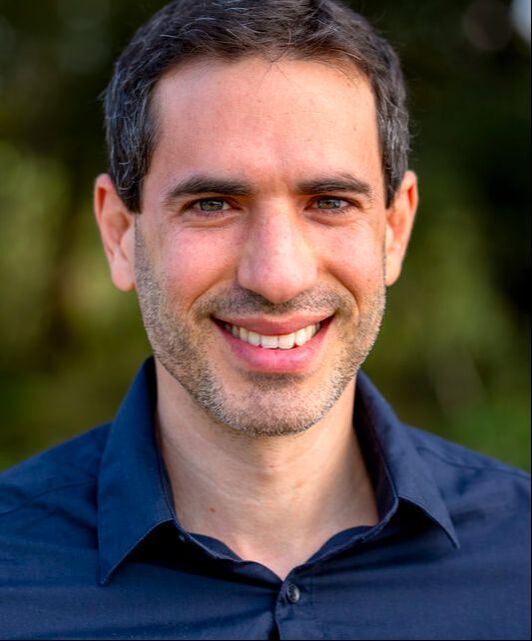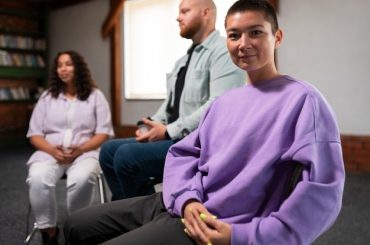Self Recovery provides an evidence-based addiction program, down to the deepest issues. And its results prove why that’s important.
“I don’t use technology,” admits Dr. Daniel Hochman. It’s ironic, then, that he created Self Recovery, a holistic addiction-recovery program which you complete online at your own pace. “I just got the right help to build it,” Dr. Hochman says.
Who is Dr. Hochman?

He’s a practicing psychiatrist based in Austin, Texas. After completing medical school in Galveston and his residency in Denver, Dr. Hochman returned home to Austin and has served his community as a psychiatrist for hospitals and clinics, as well as in his own private practice. He believes in making sure people address their underlying issues, and he only accepts patients for medication management if they’re interested in psychotherapy alongside it. That’s an addiction treatment philosophy you don’t usually find.
It’s because Dr. Hochman long ago recognized that most addiction treatments are usually lacking something. “When I was in medical school,” he says, “I was led to believe that addiction treatment meant practical changes. Like, Stop drinking alcohol, you’re hurting your liver.” But he found that addiction patients already know the risks. “That obvious, superficial advice doesn’t help them.”
Understanding the nature of people’s suffering, and helping them through it, forced Dr. Hochman to adjust. It’s part of what led him to create Self Recovery.
What is Self Recovery?
It’s an online addiction recovery program which Dr. Hochman designed using the best research-based methods. Because it’s online and available to anyone, it provides on-demand access. But Self Recovery being an online portal is no gimmick: “I was extremely careful to bring the absolute best to people in recovery,” Dr. Hochman says. “90 percent of people with addictions never do anything about it, and those who do reach a facility usually get treatment that’s not evidence-based.” Self Recovery aims to turn the tide against both inaccessible and ineffective addiction treatment.
Why is it Online?
Dr. Hochman’s experience with in-person addiction therapy helped form Self Recovery’s strategy. “What’s the biggest barrier to addiction treatment? People feel shame about entering treatment,” he says. “But being online removes that shame. You’re not playing the games I see with in-person therapy. You’re with yourself, without the facade.”
But Self Recovery does much more than online access: it focuses on the deeper issues that drive addiction.
The Underlying Needs
“Self Recovery gets you to think about what’s going on with you as a person,” Dr. Hochman says. “Everybody with an addiction faces some kind of an emotional or psychological driver. Self Recovery helps people understand what those are, and how they can manage them at a deeper level.”
The “instruction-mode” treatment Dr. Hochman once learned doesn’t cut it. “Avoiding your triggers or hanging out with new people isn’t enough,” he says. “You have to understand the forces that brought you to addiction in the first place.” Self Recovery helps people correct those forces, so they aren’t left struggling to manage their triggers day after day.
What Does Self Recovery Include?
It features both self-directed activities and interpersonal engagements, all based on proven educational design. “You can’t just throw information online and expect it to work,” says Dr. Hochman. “I sought out educational design experts to put the approach into a curriculum that truly helps people learn new information, and then apply it.”
Personal Recovery
Self Recovery combines video lessons with personal exercises like journaling, reflection or day-to-day practice in students’ lives. Those videos are bite-sized so that topics are easy to grasp. Plus, anyone can fit them into their schedule.
As for the exercises, they range from the everyday, practical actions to the underlying, emotional realizations. Self Recovery guides people to apply new psychological concepts to their current living situation. That way, the students can work through their everyday conflicts and dilemmas with a stronger foundation.
Relational Recovery
But Dr. Hochman knows you also need interpersonal connection to fully recover. Self Recovery accommodates that need. It provides two support groups per week, led by trained facilitators, where students can choose their anonymity. The program also guides you through how to engage and use existing people in your life, including mentors, family members, and friends you already have. “Self Recovery won’t replace human connection,” Dr. Hochman says, “but, instead, it’ll help people safely explore and work on themselves, so that they connect and heal with the people already special to them.”
Low-Risk, Effective Recovery
Despite all these features, Dr. Hochman knows that people might view an online addiction recovery program with skepticism. That’s why Self Recovery has a 30-day money-back guarantee. There are no contracts, and anyone can walk away if they’re unsatisfied. “Traditional treatment forces patients to take a leap of faith and risk their time and money,” says Dr. Hochman. “I wanted to give people a way to move forward without that concern.”
And Self Recovery delivers. Its results are on par or better than traditional rehabs, based on a before-and-after assessment of Self Recovery students. Well over 90% of those students show significant improvement, which traditional programs can’t always boast. “It’s effective because people can be open with themselves, and the tools they get address important underlying issues,” Dr. Hochman says. “It’s why patients do well and stay well.” Those research-based tools actually grow in effectiveness over time. That way, you won’t slide backward after completing treatment.
So What Now?
Take the time to learn more about Self Recovery. See if it fits your needs, or if it might help someone you care about. And, if you’re looking for a fresh start with a new strategy, enroll today with their 30-day money-back guarantee. “I want to see more people access clinically-proven care,” says Dr. Hochman. “No one should have to suffer alone.”
Keep an eye out for Self Recovery on In The Rooms, which, like Dr. Hochman, wants to give its users all the recovery options they need. Join us today, and learn how we can serve your new or ongoing recovery!







1 Comment
Pingback: What is Telehealth for Alcohol Recovery? - ITR